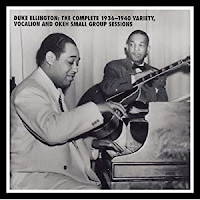In 1936
Duke Ellington had been leading a big band for a little more than 10 years and he was an international star, possibly the highest-paid black entertainer in the United States. At this point he undertook a series of small-group sessions. Some of the standout tracks: "Tough Truckin'," "Indigo Echoes," "Love in My Heart," "Pyramid" "Chasin' Chippies" and "Delta Mood."
None of them are very famous; most are based on the templates of better-known Ellington songs. They are all marked by Ellingtonian arrangement methods, and in many places the band just flies. Most of these weren't issued as Ellington records. The most prominent of his sidemen -- Johnny Hodges, Cootie Williams, Barney Bigard -- were listed as bandleaders; on one session, the trumpeter Rex Stewart, new to the Ellington organization, was drafted as leader. (He ended up spending nine years with the band.) Why did this happen? To keep great, underpaid, underrecognized musicians with him for the long haul, Ellington needed strong diplomatic skills. And, it seems, making cheaper list-price records that could be aimed more directly at jukeboxes was also a factor. A hit kept the experiment going: "Caravan," from 1936, the first and very widely heard version of it.
Ellington's music tends to be consumed on CD these days either by canonical collections of his early music or by his later, more carefully programmed LPs; this is a giant serving of early work, with unreleased alternate takes, offering the real truth from a great period of a great band.









